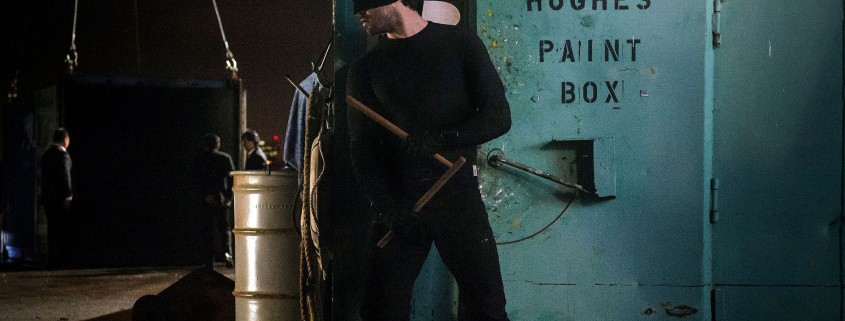Daredevil leaps into spotlight
It is a good time to be associated with Marvel Comics. That statement has been generally true over the last few years with the explosion of the Marvel Cinematic Universe, but now is one of the high points. Avengers: Age of Ultron is quickly approaching its May 1 release date, and the Hulk-level destruction it is about to unleash upon the worldwide box office. If Furious 7 — which has exceeded all expectations to zoom past the $800 million mark already — doesn’t reach the vaunted billion dollar mark in the next couple weeks, Age of Ultron is essentially guaranteed to become the 20th movie to ever do so.
Amid all the Avenger brouhaha, however, Marvel Television has gifted its fans with quite the aperitif. The Netflix original series Daredevil was released on April 10, exactly three weeks before Ultron. It is a sleek, dark series that works amazingly well in contrast with the tentpole spectacle that Ultron is about to unleash. Daredevil stands both as a testament to the cinematic universe that Marvel has been able to build better than anyone else, and as a reminder that not all superhero properties need $100 million budgets to be interpreted perfectly for the screen.
The Daredevil series is firmly entrenched in the Marvel Cinematic Universe. From the very first episode, the aftermath of the events of the first Avengers movie are not only felt, but intertwined into the story. This model, of course, has been used by Marvel before for its Agents of S.H.I.E.L.D. and Agent Carter series on ABC. Daredevil, however, feels very different from those. Though Agents of S.H.I.E.L.D. has become a very entertaining TV show, it is very firmly in the old guard in terms of style. S.H.I.E.L.D. has a mostly unknown cast facing mystery-of-the-week one-episode arcs with unspectacular special effects. Though a very fun series, it would be a stretch to declare S.H.I.E.L.D. a series that would be guaranteed to stand by itself without the MCU to lean against.
Again, Daredevil is very different. Here is a series that would undoubtedly stand firmly under its own power. It uses a complex story structure spanning several episodes. Its cast includes established talents like Rosario Dawson, Vincent D’Onofrio and Scott Glenn playing against the relatively unknown but impressive Charlie Cox in the lead role. This show makes the coveted leap that the very best TV (Breaking Bad, Game of Thrones, etc.) has aired recently. It is not so much a classic TV, but rather a 13-hour movie released in parts.
All the usual strengths of this type of format are covered here. Thirteen hours with Charlie Cox’s Matt Murdock makes for a very familiar and fleshed out character. For comparison’s sake, Robert Downey Jr.’s role as Tony Stark will only be completing its eleventh hour on screen at the completion of Ultron despite being in five films as a central character. Marvel devoted two entire movies, Iron Man 2 and Iron Man 3, in trying to show the more human side of Stark. Despite this, In one quick dump of Daredevil episodes, Matt Murdock — Daredevil’s secret identy — has leapt to the top in the Marvel leaderboard for dedicated screen time — only Agents of S.H.I.E.L.D. has enjoyed more screen time, but individual character development is less of a priority in a show like that.
Daredevil is a great choice as the first character to get this sort of deep dive treatment from Marvel. His storyline since his creation by Stan Lee in the ’60s is one of the most complex in the Marvel Universe. Frank Miller’s legendary run at the helm of the comic book during the early ’80s resulted in one of the better, darker character arcs one can find in a major comic book property. Matt Murdock’s struggles with justice, vigilantism and corruption are ripe with possibilities. Additionally, his very unique power set as an acrobatic blind martial artist have led to very creative depictions in the comics of how Daredevil “sees” the world.
Really, Daredevil is one of the most interesting characters in the entire universe. Likely the only thing that stopped him from being featured in one of the upcoming Phase 3 MCU films with the likes of Doctor Strange, Black Panther and Ant-Man (technically the last film of Phase 2) is the stigma that still lingers from the 2003 feature film starring Ben Affleck. That film is not as bad as its reputation suggests, with Colin Farrell’s maniacal Bullseye and Michael Clarke Duncan’s mountainous Kingpin playing their parts to perfection. It is, however, an example of a movie getting the tone of its source material very wrong. The film’s reputation is very poor, and it likely played a big part in Marvel’s decision to “relegate” Daredevil to a TV slot as opposed to splashing his name on the El Capitan Theatre big screen back in October’s big Phase 3 announcement.
But, by all appearances, this relegation has been a boon for the character. Affleck’s 2003 debacle has led to 13 high-quality hours with the character instead of two. In addition, four to eight additional episodes are coming in the eventual Defenders miniseries planning to incorporate Luke Cage, Jessica Jones and Iron Fist (if you are not familiar with Iron Fist, you should really familiarize yourself with it). All those characters are eventually getting their own Netflix series, but the crown jewel is Murdock. The character has found new life in what is possibly its optimal on-screen format and no one should be surprised if he makes it into the next tentpole Avengers production Avengers: Infinity War Part 1 in 2018 as MCU boss Kevin Feige has strongly hinted. The Marvel train just keeps on rolling.
Daniel Grzywacz is a senior majoring in anthropology and neuroscience. He is also the lifestyle editor at the Daily Trojan. His column, “The Showbiz Must Go On,” runs Mondays.

